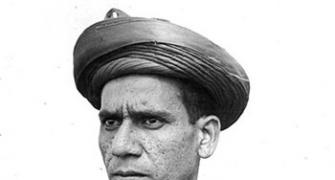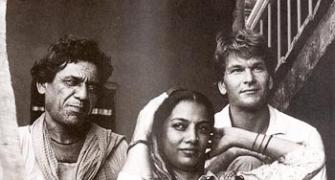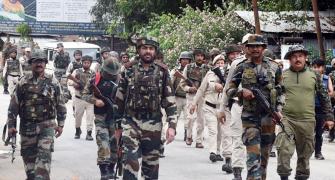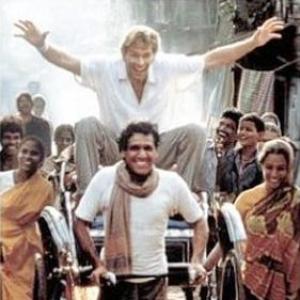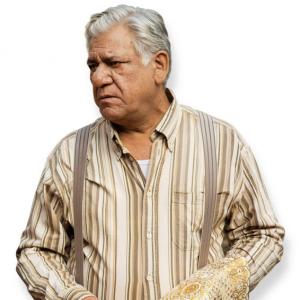'If it weren't for Om Puri, a whole range of our big city experiences wouldn't have found their honest representations on the screen,' notes Sreehari Nair on the legendary actor's birthday.

In my evolution from an overweight Madrasi kid with a messy, tousled top to a still-overweight, fully assimilated Mumbaikar with a receding hairline, I have remained a fan of 'the little guy who makes it in the big city' trope of movies and movie lore.
I adore the village runt who wouldn't pick up money that the slickers casually throw at him.
It stimulates me to think that Hollywood's wiliest gangster began as a skinny Sicilian boy in a quarantine cell, his back turned to us, and murmuring plaintively a folk song about his pet donkey.
My idea of a key historical event is a scrawny, down-and-out 23-year-old future Bollywood superstar standing on Marine Drive and announcing, 'One day, I am going to rule this city.'
I was and continue to be a sucker for the romantic tradition of 'metropolitan conquest' that the movies have been serving up for me. Yet, as I age, as I take stock of all that I couldn't become, the battles lost and the compromises made, I am compelled to look closely at Om Puri, one of the tradition's chief disruptors.
Om Puri's place in world cinema is secure, not as a conqueror but as a chronicler of cities on the boil.
He doesn't soothe our innate fear of being trapped in an uncaring crowd, oh no, he clarifies that fear, makes us confront it, and, in his finest hours, helps us see the poetry in it.
In cities as varied as Mumbai, Kolkata and Manchester, he has been defeated by the funny system, by prim and elegant women, by small-time goons, by crafty politicians, by sinless children, by his friends and co-workers, and defeated by one of Hindi cinema's greatest losers, Mushtaq Khan, well-known for fleeing the arena every time he is called for a duel.
And yet, it is as the ultimate dreamer, the eternal optimist, surrounded by glass buildings and among faces and souls tough as asphalt and pavement, that Om Puri discovers his true purpose as an actor.
He comes into his own as the expat, as the deracinated one, as the slightly out-of-phase, out-of-tune migrant yearning for his mother's lap away from home.
We need him because no other screen actor has made us so acutely aware of the grit and fiber of big cities.
We need him because we don't have a comparable example on celluloid, of someone who has so frequently and so feverishly wrestled with those oppressive elements of city life: the rain, the exhaustion, the heat, the sweat, the frigidness of the hearts, the slush in the sewers, the stink, oh, the stink.

Hazari Pal gets a taste of this peculiar form of oppression the moment he steps out of the Howrah railway station, and into the Calcutta of squealing trams, yellow-topped cabs, policemen in whites, and spectral figures sashaying in saffron.
Around him, the volume control is turned up to the maximum, the smell control is turned up to the maximum, and Om Puri demonstrates in five minutes flat that the child of the dust bowl is experiencing an assault on his senses.
As Hazari crosses the road, or better yet, as he tackles the job of crossing the road, he drags into his circle of confusion his wife and three kids, one of whom carries a sleeping mat which pokes Hazari in his pockmarked face.
After a few tests of resilience, the city hurls in his direction a chance at employment, and his gratitude in that scene is so affecting that it seems to cure, like Prozac and amphetamines, decades and decades of indifference and sleep.
With nimble legs, a willing-to-please back, and a black thread around his neck to ward off evil spirits, he lugs his rickshaw through the cobbled streets of the cobwebby metropolis -- the atoms of his body jostling the languorous energy of the place.
Come to think of it, Balraj Sahni's fabled rickshaw puller was almost a religious figure. His essential goodness, you couldn't touch. Hazari Pal represents a secular version of that same sprint; somebody whose minor disappointments singe as much as his major heartbreaks.
Even the window mannequins he stops to admire -- those frozen goddesses ready to take over the night in their pretty negligees -- outface him with a kind of drowsy arrogance.
When he awakens from a roadside nap to blink at an Air India hoarding (with a message that bites: 'Have you ever dreamed of a Maharajah Double Spring as a present?'), the counterpoint acquires visceral dimensions.
And yet, in the course of Roland Joffé's somewhat simpering movie, Hazari proves himself to be pluckier than any of the fat cats who rebuff him.
Watching him go around Calcutta's most cherished, predictable, exhausted landmarks, you get the feeling that the man is his own endorsement.
Breathing through his pickaxe teeth, the same teeth with which he later clasps his rickshaw's plastic cover as he runs in the rain, Hazari becomes one of cinema's great displaced heroes in cinema's greatest dreamland: The bicycle thief in Rome; the lovelorn cop in Hong Kong; the haggard detective in Los Angeles; the moon-eyed rickshaw puller in the City of Joy.
This, then, is why we need Om Puri -- because he shows us what it means to have a city thrust itself upon you, thrust itself as a roguish player who holds all the aces, tantalizing yet dark, an invisible, immense force.
On the other hand, we need him because he has given us one of the finest dramatizations of what it means to feel weightless in a big city.

Raj Karan Yadav, the taxi driver of Sudhir Mishra's Dharavi, may be clued in to all the sordid underbellies of Mumbai but sensations such as anomie and despair are not for him.
The sounds of local trains puncture the quiet of his slums like unwelcome heartbeats. But they do not matter to Raj Karan Yadav, for he knows he is on the verge of a breakthrough.
So he washes clean with four quick splashes the windshield, the rear, and the doors of his Premier Padmini, before pouring over himself a bucket of cold morning water. He is a man with a plan, a business plan to be precise.
Yadav's taxi-driving days now on their last legs, he steers his livelihood like a happy Travis Bickle, puffing away, the cabin of his taxi festooned with grapes.
Though the grapes are plastic, he can feel the season of bloom all about him. And his happiness gets transmitted to even the traffic lights, which dance to the tune of Ek Do Teen rippling from his stereo.
Seen through his eyes, Bombay appears to be in a state of cosmic disarray: BEST bus-stands have started to tip over; Mughlai restaurants have their own names misspelled; junkies and whores are gloating in their personal codes and their dreams of mop-up; from the back of giant vans peer little children, their bodies so arranged that we are not entirely sure if they are off to school or juvenile prison.
But the funny, sensual bird that Yadav is, he feels no obligation to clean this rot.
Propped up by his detachment, the rot starts to assume a rich pulpiness. And as the neon signs on the high street change poses, back in Dharavi, Raj Karan Yadav's wife queues up in front of a water tanker for their daily supply -- this ritual, a silent assertion of the sea that had been there before the city.
Of course, he has come from somewhere else, from a lawless, slow-moving small town, in search of something he had seen at the movies or read about in the weeklies.
Yadav's search for that self-image ends every night after his last peg, when he goes off on a fantasy date with a matinee star.
Dressed in a blood-red sari, Madhuri Dixit plays this fantasy date. She is the absolute synthesis of everything the movies have promised but not delivered. She justifies Raj Karan Yadav's feelings of superiority, begs him to not put the snob in him down.
Dharavi was produced by NFDC and Doordarshan, and the Om Puri-Madhuri Dixit arc is a stabbing metaphor for how the grimy, homebrewed arm of our cinema gets done in by its mainstream counterpart of assembly-line silver and dry ice backdrops. The gorgeous camp siren first pledges her lifelong allegiance to the star-struck rube, and then she stands him up.
After Raj Karan Yadav's business turns to dust, after his wife leaves him, after he is covered in wheat flour and left crouching on the railway tracks, when he wishes for the blood-red fantasy to materialise, she stays away.
So he goes back to being a taxi driver, a fallen fowl but hopeful all the same; and Om Puri approaches Yadav's situation with so much humour and good faith, brings to it such a sense of slobbering universality, that he becomes a shorthand for all those monarchs-in-waiting, ones for whom success is always just around the corner, pursuers of get-rich-quick plots and multi-level marketing schemes, full of plans and go-go-go, those twitchy creatures who can never sit still in a city that throbs with an endless pulse.
Is this the secret appeal of Om Puri in a big city -- that he doesn't follow the cheery template of the man on a mission, that he chooses instead to be the man in perpetual motion?

In Govind Nihalani's Ardh Satya, we see him in well-fitted police uniform and Aviators and rubber gloves riding his Enfield past the Sion-Matunga axis, past the soot and the oceanic honking of vehicles.
Sub-Inspector Anant Velankar rides past paan shops open at midnight and pav bhaji stalls ladling out small mercies by the streetlight. He goes past social justice conclaves headlined by forgotten Jeremiahs like Shanta Gokhale, and past billboards of Modi Continental: 'TYRE THAT NEVER TIRES.'
Moving past panhandlers, queens, nymphs, he goes on the lookout for the nearest hooligan, petty thief, pusher, the nearest huckster, squatter, stutterer of insensitivities.
So diligent is Anant Velankar in his desire to keep going that it hurts us to make out the paternal forces stifling him. There is a father figure in the city taunting him to bend a wee bit (the smiling swine, as perfected by Sadashiv Amrapurkar), who summons up memories of his own father back in Sangli putting little Anant down for another round of Surya Namaskar.
When Om Puri, in his haunting gravel voice, reads Dilip Chitre's theme poem, he paraphrases for us the existential prison that the policeman finds himself in.
Taking off from this recitation, what Puri brings alive in the course of Govind Nihalani's movie is not urban alienation, or something so fanciful, but that feeling of impotence, pure and simple, that grips us ever so often when we are outrun or passed over -- a feeling that causes the pistol in Anant Velankar's hand to go limp.
He then draws a connection between this feeling of impotence and the terrible acts of violence that men commit.
Mumbai is Velankar's constant therapist but without a velvet couch to offer him. And so, after he has tongue-lashed his biological father into silence and silenced with bare hands the spiritual father who wants to have him on a leash, Inspector Velankar rides into the dark of the night and declares himself. The city watches, as a man escapes.
Since I had first come upon Ardh Satya, Dharavi and City of Joy as a mere adolescent, Om Puri's performances in these movies had gone only so far as to deepen the contrast between the ostensible innocence of our countrysides and the perceived tyranny of our big cities.
Back then, I used to believe that truth was to be found in pastoral Kerala, with its ever-curious folks, pebbled courtyards, swaying green fields and bored cows, who chewed their cuds with lazy elegance.
Kerala was home, and the dread was for that suburb of the large city I was growing up in -- a Mulund of pesticide and pharmaceutical plants, vegetable oil refineries, illegally occupied government quarters, a suburb where sirens stopped hearts and where people did not stop to study each other's faces.
But all that changed recently.
Upon revisiting Hazari Pal, Raj Karan Yadav and Anant Velankar after a substantial time gap, the man behind those characters became to me something more: an advocate for the human will in a mechanically arranged world.
Om Puri reminded me that my aging parents were once young and eager in a city that they couldn't make complete sense of, and he reminded me also of those alley radicals and backstreet instructors who were now dead or wobbly, sparkplugs who had taught me about 'tough love' and 'doing without.'
Slowly, I began to comprehend what Puri had done.
He had constructed for me another model of home: The city that was, the city I couldn't go back to.
Those pesticide and pharmaceutical plants had shifted their base to Gujarat; there were no refineries to change the blue of the evening sky to beautiful coral pink; the once-bustling government quarters were so deserted that they had turned into love nests; we are talking about a suburb where exhaust pipes had replaced chimneys, and whose children now mostly breathed petrol fumes.
So there it was -- an unexpected detour, a sudden sentimental journey for fending off pernicious thoughts. And when I had recouped my wickedness, it was interesting to learn that the actor who had broadened my understanding of 'home' may well have been shaped by his own history of homelessness.
It is true that plain biographical details can very often reveal the essence of a genius, and here is one more piece of evidence to back up that argument.

Om Prakash Puri was not more than six when deprived of the roof above his head. The father, an employee with the Indian Railways, was jailed on the charge of stealing cement from his workplace. To support his family, little Om would grind away at a railway tea stall, collect valuable coal from the neighbouring tracks, and it's safe to presume that the calluses borne by the child must have informed the man's art.
It was an art that insisted on giving praise without softening the blows.
It was an art steeped in longing, a longing that took the pockmarked face, the pickaxe teeth, the gravel voice, and made out of those features something grand, memorable, permanent. Almost all of Om Puri's little-guy-in-a-big-city characters are anointed by this brand of longing; why, even Zahir Khan of East is East is not exempted.
To the makers of East is East, Zahir Khan is a despot who upholds antiquated notions in a modern world, a Pakistani who wishes to retreat into the oppressive customs of his homeland, the wretch in Manchester.
Om Puri gives this character context, takes us to the heart of the despot's cause, suggests that despotism is frequently an exercise in reclaiming lost time carried to its ridiculous extreme.
It helps that Manchester in 1972 is a weak blurb for 'the world's first industrialised city.' The brick buildings are anemic; everyday conversations are as gray as the English novels of that age; the nippers, who can be seen casting their fishing rods into neighborhood drains, resemble grumpy failed colonialists.
This is a city desperate to regain its identity, and it is in this city that Zahir 'George' Khan proudly reaffirms his identity. He feeds the Brits their favourite snack (fish and chips, needless to say), and when a local clergy member confers on him a 'God Bless,' Khan turns the blessing on its head. "May Allah be with you," he says with a practiced sneer.
Khan speaks about his religion 'majestically' -- there is no other word for it -- and his idea of an initiation seminar is asking his sons to 'go see how chicken killed.'
But if old-fashioned, he knows the time-honored trick of surprising his wife with an affectionate pat on her rump, and a grainy print of Chaudhvin Ka Chand can move him to tears like nothing else.
His excessive pride in his roots would have qualified as 'ornery'; except that, in the hands of Om Puri, Zahir Khan becomes an index to a rather sad anthropological fact. We talk about multicultural societies as melting pots. Yet, it is in such societies that one most feels the urge to define oneself in narrow terms. When Khan dismisses his youngest boy's fear of circumcision with, 'Foreskin is not our religion, son,' he toots a shout-out to all our Samajams and Samitis, our Sanghs and our Welfare Groups, well-meaning but self-evident tokens of cultural balkanization.
I cannot help but think that if it weren't for Om Puri, a whole range of our big city experiences wouldn't have found their honest representations on the screen.
Without appealing for our sympathy, Puri shows us what it means to be lively yet confused in a big city, to be comfortable and to be thwarted, to feel purposeful, to feel off-the-mark, and he shows us what it means to grow old and unwieldy in a big city.
Hazari in Calcutta is struggling to build a life; Zahir Khan in Manchester is preparing for the afterlife -- and there's a touch of melancholy that binds both those pursuits.

It would be fair to postulate that Hazari Pal, Raj Karan Yadav, Inspector Velankar and Zahir Khan occupy a unique place in our cinematic landscape: That is to say, between Chaplin's Tramp and Urban Kings; between the powerless cockroach and the pistol-whipping gangster; between self-pity and self-commemoration.
But most importantly, perhaps, Puri lends these characters a certain personal edge, which reaches back to the humiliation he had suffered as a kid.
If you lose your address at age six, it turns you into a permanently anxious citizen.
The sadness in Om Puri's eyes owes little to the history of movies and much to that six-year-old kid.



